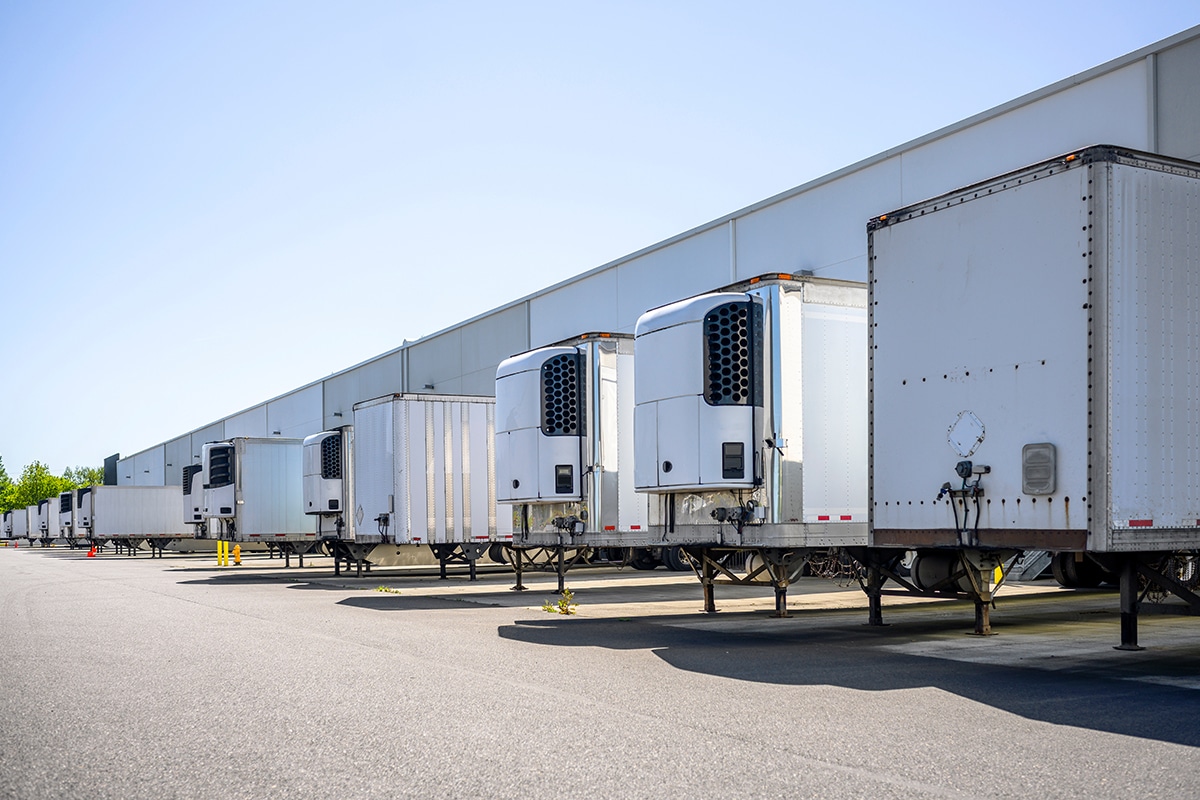Thermo King Truck Refrigeration: Efficient Cooling Down for Your Fleet
Thermo King Truck Refrigeration: Efficient Cooling Down for Your Fleet
Blog Article
Leading Innovations in Transport Refrigeration: Enhancing Efficiency and Safety
The landscape of transport refrigeration is undergoing significant change, driven by technologies aimed at enhancing both performance and safety and security. As these innovations proceed to develop, it is important to discover their ramifications on functional practices and governing conformity, triggering a more detailed examination of exactly how they reshape the future of transport refrigeration.
Smart Temperature Monitoring Systems
In the world of transport refrigeration, wise temperature tracking systems have actually emerged as a critical innovation for ensuring the stability of temperature-sensitive products. These advanced systems leverage Internet of Things (IoT) technology to provide real-time data on temperature fluctuations, making it possible for operators to maintain optimal conditions throughout the supply chain. By continually tracking the temperature of chilled containers and lorries, companies can quickly identify inconsistencies that might compromise product top quality.

Moreover, smart monitoring systems usually incorporate automated informs and notices, allowing stakeholders to respond without delay to any potential issues. This proactive approach not only decreases the risk of putridity but additionally enhances conformity with regulative requirements regulating food safety and security and pharmaceutical transportation.
The integration of data analytics within these systems additionally helps with predictive upkeep, assisting drivers to foresee possible tools failures before they happen. This ability decreases downtime and maximizes functional efficiency, eventually leading to cost savings.
Eco-Friendly Refrigerants
Smart temperature level surveillance systems play a crucial role in keeping item quality, but the effectiveness of transport refrigeration also rests on the choice of refrigerants used. As environmental issues rise, the change towards green refrigerants has come to be necessary. Conventional refrigerants, such as hydrofluorocarbons (HFCs), are notorious for their high Global Warming Potential (GWP), contributing significantly to environment modification. On the other hand, emerging choices like hydrocarbon-based refrigerants and hydrofluoroolefins (HFOs) present reduced GWP alternatives, providing both efficiency and sustainability.
These green refrigerants not just reduce ecological effect but additionally align with global regulations targeted at phasing out unsafe materials. Their fostering can lead to improved power performance, inevitably lowering operating expense for transport refrigeration systems. The use of all-natural refrigerants, such as ammonia and carbon dioxide, has acquired grip due to their outstanding thermodynamic homes and lower environmental impact.
Investing in green refrigerants is not simply a governing compliance measure; it stands for a strategic decision that enhances brand name track record and promotes customer loyalty. thermo king truck refrigeration units. By prioritizing lasting techniques, business can add to a greener future while guaranteeing the integrity of transported items
Advanced Insulation Materials
Utilizing advanced insulation materials is crucial for enhancing transportation refrigeration systems, as they substantially improve energy effectiveness and keep consistent temperature control. Standard insulation techniques often fall short in preventing thermal transfer, leading to boosted power consumption and changing temperatures within refrigerated areas.
Emerging materials such as vacuum protected panels (VIPs) and aerogels provide premium thermal resistance, permitting thinner accounts without endangering performance. VIPs, as an example, utilize a vacuum layer to minimize conductive and convective warmth transfer, making them suitable for space-constrained applications. Aerogels, understood for their light-weight and permeable framework, supply extraordinary insulation while substantially decreasing total system weight.
In addition, incorporating stage modification products (PCMs) right into insulation systems can further support temperature levels throughout transit. These products absorb and release thermal energy, efficiently buffering against exterior temperature level variations.
The integration of these innovative insulation products not only decreases the operational costs connected with power consumption however additionally prolongs the rack life of temperature-sensitive items. As the transport refrigeration industry remains to progress, the adoption of innovative insulation innovations will certainly be critical in enhancing both efficiency and safety in refrigerated transportation.
Automated Path Optimization
The efficiency of transport refrigeration systems is considerably improved through automated route optimization, which leverages real-time information and innovative formulas to establish the most reliable paths for distribution. By analyzing numerous aspects such as web traffic patterns, weather problems, and distribution windows, these systems can significantly minimize travel time and gas usage.
Automated course optimization lessens human error and subjective decision-making, which can bring about ineffectiveness. This modern technology allows fleet supervisors to allot resources better, making sure that refrigerated goods keep their needed temperature throughout the trip. By maximizing paths, companies can likewise improve customer contentment via prompt deliveries.
In addition, automated systems can adapt to unforeseen situations, such as roadway closures or abrupt web try this out traffic spikes, enabling dynamic rerouting. This adaptability not just shields the honesty of temperature-sensitive products yet likewise adds to overall functional performance.
Carrying out automated course optimization can cause considerable price savings while decreasing the carbon footprint related to transport. As organizations progressively focus on sustainability, this technology stands apart as a critical component in modern transportation refrigeration, straightening operational objectives with ecological responsibility. Inevitably, automated path optimization represents a substantial development in the quest for efficiency and safety in transport refrigeration.

Real-Time Data Analytics
Automated course optimization substantially advantages from the combination of visit this site real-time data analytics, which gives crucial understandings into the performance of transportation refrigeration systems. By making use of real-time data, transport drivers can keep an eye on temperature level variations and equipment efficiency, ensuring that disposable products are preserved within needed parameters throughout transportation. This positive method not just enhances the quality of the moved items yet likewise alleviates the danger of spoilage and loss.

Along with boosting performance, real-time analytics boosts safety and security by guaranteeing conformity with regulatory standards for temperature control. This not just shields public health but also fortifies a business's credibility - refrigerated transportation thermo king. As the transport refrigeration sector evolves, the combination of real-time data analytics emerges as a foundation for driving technology, sustainability, and functional excellence
Final Thought
In conclusion, the developments in transport refrigeration significantly improve both efficiency and safety within the market. Smart temperature level monitoring systems and real-time data analytics offer important oversight, while environment-friendly cooling agents and advanced go insulation materials add to sustainability and energy performance. Automated course optimization algorithms not just reduce travel time but additionally minimize ecological influence. Collectively, these advancements stand for an important advancement in transport refrigeration, guaranteeing conformity with regulative criteria and advertising a greener future.
The landscape of transportation refrigeration is undergoing considerable makeover, driven by advancements aimed at boosting both performance and safety and security.Smart temperature level surveillance systems play a crucial role in keeping product quality, but the performance of transportation refrigeration likewise hinges on the selection of refrigerants used. Their adoption can lead to improved energy effectiveness, inevitably lowering operating prices for transport refrigeration systems. Eventually, automated route optimization represents a substantial innovation in the mission for efficiency and safety and security in transportation refrigeration.
In verdict, the innovations in transport refrigeration substantially enhance both efficiency and safety within the industry.
Report this page